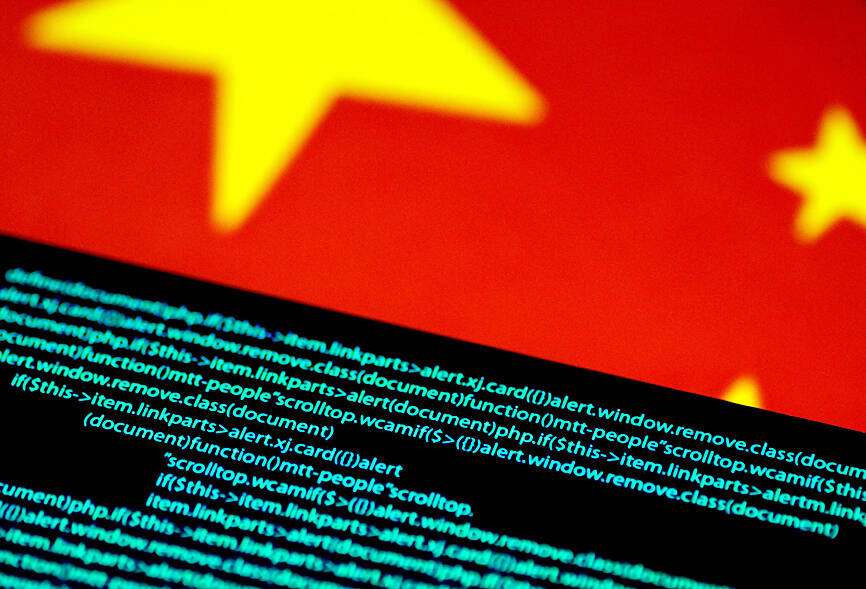Western intelligence agencies on Tuesday warned of an increasing threat from Beijing’s security services to use malicious mobile phone applications to surveil Taiwanese independence activists, Tibetan rights advocates and others opposed by the Chinese government.
An advisory issued late on Tuesday warned of “the growing threat” posed by malicious surveillance software deployed by a Chengdu, China-based contractor reported to have ties to the Chinese Ministry of Public Security.
The advisory was signed by cybersecurity agencies in the UK, the US, Canada, New Zealand, Australia and Germany.

Photo: Reuters
Those most at risk include people connected to Taiwanese independence, Tibetan rights, Uighurs and other minorities in Xinjiang, democracy advocates — including in Hong Kong — and the Falun Gong spiritual movement, the British National Cyber Security Centre (NCSC) said in the advisory.
The warning comes amid increasing tensions surrounding Taiwan, including Chinese military drills around the nation on Tuesday and Wednesday last week, and a March 28 visit to the Philippines by US Secretary of Defense Pete Hegseth in which he reaffirmed Washington’s commitment to deterring Chinese aggression in the region.
The Chengdu-based contractor, Sichuan Dianke Network Security Technology Co Ltd (四川電科網路安全技術有限公司), was linked to the deployment of a pair of distinct malware packages. They were tracked as “Badbazaar” and “Moonshine” and used to ferret sensitive information from mobile devices, while also giving operators remote access to devices’ cameras, microphones and location data, the advisory said.
The warning is for non-governmental organizations, journalists, businesses and other individuals who advocate for or represent the groups, the NCSC said in the advisory.
“The indiscriminate way this spyware is spread online also means there is a risk that infections could spread beyond intended victims,” it said.
Chinese embassy in Washington spokesman Liu Pengyu (劉鵬宇) said that China “firmly opposes the smear attacks against China without any factual basis,” and that the tracing of cyberattacks is complex.
“We hope that relevant parties will adopt a professional and responsible attitude when characterizing cyberincidents, basing their conclusions on sufficient evidence rather than unfounded speculation and accusations,” he said.
The warnings build on previous cybersecurity industry reporting that malware and infrastructure have been used by the contractor going back several years. The advisory cited a Jan. 29 report published by Intelligence Online, a news organization focused on international intelligence operations, linking the malware to the contractor.
The contractor has provided services to the Chinese ministry, the report said.
The FBI, US National Security Agency and intelligence agencies in Australia, Canada, Germany and New Zealand participated in the advisories, the NCSC said.
The FBI declined to comment, and the NSA did not respond to requests for comment.

OPTIMISTIC: The DGBAS sharply upgraded its GDP growth estimate from 3.54 percent to 7.71 percent after the Taiwan-US trade agreement signing and given AI optimism The US imported more from Taiwan than China for the first time in decades, as US President Donald Trump’s tariffs reshape trade flows while a global boom in artificial intelligence (AI) fuels demand for tech products. US purchases of goods from China plunged almost 44 percent in December last year from 2024 to US$21.1 billion, US Department of Commerce data showed on Thursday. By contrast, shipments from Taiwan more than doubled during the same period to US$24.7 billion. The soaring Taiwanese shipments to the US reflect the huge expansion in supplies of chips and servers for AI companies, which has completely changed

The Central Election Commission has amended election and recall regulations to require elected office candidates to provide proof that they have no Chinese citizenship, a Cabinet report said. The commission on Oct. 29 last year revised the Measures for the Permission of Family-based Residence, Long-term Residence and Settlement of People from the Mainland Area in the Taiwan Area (大陸地區人民在台灣地區依親居留長期居留或定居許可辦法), the Executive Yuan said in a report it submitted to the legislature for review. The revision requires Chinese citizens applying for permanent residency to submit notarial documents showing that they have lost their Chinese household record and have renounced — or have never

US and Chinese fighter jets briefly faced off above waters near the Korean Peninsula this week, Yonhap News agency reported, marking a rare confrontation in that area between the two superpowers. About 10 US fighter jets on Wednesday departed an airbase in Pyeongtaek, South Korea, for drills above international waters off South Korea’s western coast, the news outlet cited unidentified military sources as saying. While the US planes did not enter China’s air defense identification zone, Beijing scrambled planes as they neared that region, the report said. “The Chinese People’s Liberation Army organized naval and air forces to monitor and effectively respond

Taiwan has secured another breakthrough in fruit exports, with jujubes, dragon fruit and lychees approved for shipment to the EU, the Ministry of Agriculture said yesterday. The Animal and Plant Health Inspection Agency on Thursday received formal notification of the approval from the EU, the ministry said, adding that the decision was expected to expand Taiwanese fruit producers’ access to high-end European markets. Taiwan exported 126 tonnes of lychees last year, valued at US$1.48 million, with Japan accounting for 102 tonnes. Other export destinations included New Zealand, Hong Kong, the US and Australia, ministry data showed. Jujube exports totaled 103 tonnes, valued at